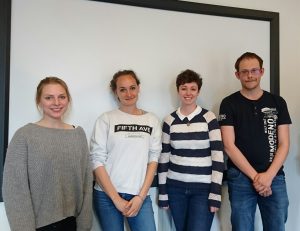 Between February and April 2017, Leonie Brasser, Alice Lambert, Laurence Schaack and Martijn van Gils followed a masterclass with Barnita Bagchi as part of their RMA in Comparative Literary Studies. In this masterclass, the students explored how the transcultural plays out in speculative writing. Beginning with an overview of utopian studies, the students decided to focus on Octavia Butler’s Parable series and produced a preliminary literature review capturing the current research in utopian studies and academic engagement with Butler’s work. Based on this research, the students worked in pairs to produce two collaborative papers, summaries of which can be found below.
Between February and April 2017, Leonie Brasser, Alice Lambert, Laurence Schaack and Martijn van Gils followed a masterclass with Barnita Bagchi as part of their RMA in Comparative Literary Studies. In this masterclass, the students explored how the transcultural plays out in speculative writing. Beginning with an overview of utopian studies, the students decided to focus on Octavia Butler’s Parable series and produced a preliminary literature review capturing the current research in utopian studies and academic engagement with Butler’s work. Based on this research, the students worked in pairs to produce two collaborative papers, summaries of which can be found below.
Martijn and Alice’s paper entitled “Unity-Diversity in Octavia Butler’s Parables: Towards a Conceptualisation of Transcultural Utopianism” focuses on ‘Earthseed’, the alternate philosophical view and religious intervention created by Butler’s protagonist to navigate through the dystopian world she lives in. Drawing on Ernst Bloch’s non-static view of utopia as an essential part of human life, this paper explores how Butler’s Parables present a utopian impulse rooted in mobility and diversity, as well as the lessons and experiences of the past triggered by an anticipatory consciousness of the present. It argues that the Earthseed communities are built in ‘relation’, bringing Glissant’s vision of métissage (cultural mixing) to bear on the novels. In particular, this paper suggests that Glissant’s comments on métissage and errantry are suitable in illuminating how Butler’s utopian vision is best viewed as a mobile and transcultural construct. The role of religion is central to this discussion, as the belief system Earthseed, itself a composite construct, forms the primary site of utopian vision in the novels. It undergirds the protagonist’s community teaching that individuals gain understanding and agency through their interactions with others. Importantly, this paper notes how Butler’s novels offer a parable for the possibility – even necessity – to bring about more composite and transcultural communities.
Laurence and Leonie’s paper entitled “Octavia Butler’s Generic Mobility: Working Against Categorisation and Single Visions in the Parables” discusses the generic hybridity of Butler’s novels. Starting from Alessa Johns’ concept of the utopian, feminist tradition, this paper analyses how Butler partly undermines the process-oriented nature of the utopian genre through disrupted social relationships, in particular the mother-daughter bond. Black feminist thought is used to explore the destabilized concept of motherhood and to explain the utopian layer of a dystopian, almost idle relationship. To further this argument, the paper discusses the narrative form that is constructed by an assemblage of media and voices. The multilayered narrative rejects the possibility of aligning Butler’s work with one totalitarian genre and supports the alternation between dystopian and utopian imagery. The introduction of hyperempathy syndrome informs this discussion, as it bears the urgency of endorsing more than one perspective in order to embrace inevitable contradictions and multiplicity. Our paper concludingly posits how Butler’s Parables should not be restrained by a generic direction, but they display that who can love, can also kill: one person’s utopia might be another’s dystopia.
The students are currently pursuing options to submit their papers to a conference / to postgraduate journals.
As part of their masterclass, the students have also contributed to the development of the Utrecht Utopia Network’s website.